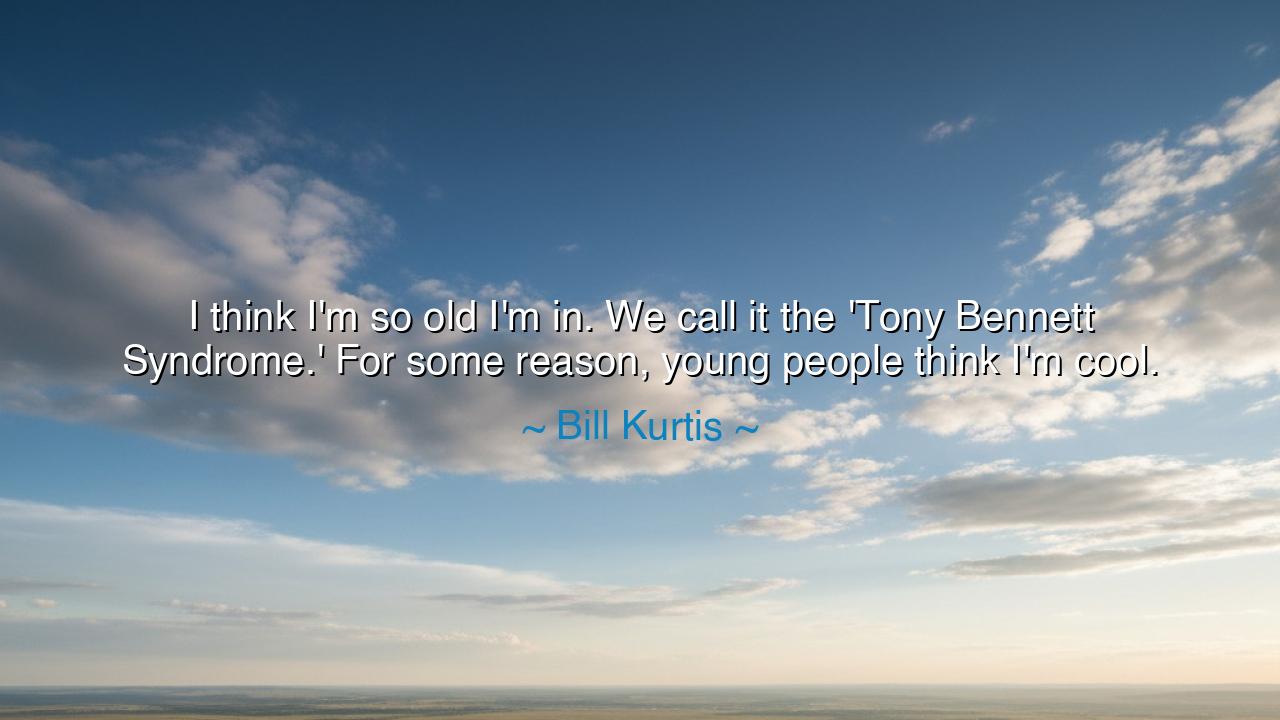
I think I'm so old I'm in. We call it the 'Tony Bennett
I think I'm so old I'm in. We call it the 'Tony Bennett Syndrome.' For some reason, young people think I'm cool.






"I think I'm so old I'm in. We call it the 'Tony Bennett Syndrome.' For some reason, young people think I'm cool." These words, spoken by the esteemed Bill Kurtis, carry with them a deep truth about the nature of time and the transformation of wisdom into something that is not only respected but revered. In the playful reference to the Tony Bennett Syndrome, Kurtis points to a phenomenon that transcends age—the idea that with the passage of time, there comes a kind of coolness that young people, in their pursuit of meaning and authenticity, begin to recognize. It is not the physical youth that defines one's worth or influence, but the wealth of experience and the quiet strength that comes with age.
In the fullness of life, the elderly have long been seen as those who hold the keys to wisdom, who possess the stories of many generations, the experiences of countless seasons. Yet, in modern times, it is often the young who seem to dominate the narrative of coolness and relevance. But as Bill Kurtis and his playful reference suggest, there is a shift that occurs with age—one where the depth of experience, the calmness of knowing who one is, and the quiet confidence that comes from decades of living, becomes its own form of cool. Tony Bennett, the legendary crooner, is a prime example of this—his timeless music and his enduring charm make him not just a figure of the past, but one who remains vibrant and relevant, admired by young and old alike.
Consider the great Socrates, who, though he did not live to see his own greatness, was a man of wisdom who captivated young minds even in his time. He was not the young, brash figure of his youth; no, his power lay in the richness of his thought, in the profound questions he posed, and in the timeless principles he passed on. Socrates' coolness was not in his appearance, but in the way he challenged those around him to think deeply, to question the world, and to pursue truth and virtue above all else. His influence grew not with the passage of years, but through the depth of his wisdom, which reached across generations, long after his physical form had departed.
Similarly, Mahatma Gandhi, though a man of simple appearance, became an icon not of youth, but of ageless principles. His coolness was not in the fashion of the day but in the strength of his character, in his ability to inspire millions with his vision of a free India through the principles of nonviolence and truth. Though Gandhi lived into his later years, it was not his physical energy but his spirit that drew young people to him. His influence was built on the solid foundation of a life lived with integrity and purpose, and it was this wisdom that made him eternally relevant.
There is a lesson to be learned from these examples: coolness is not found in the fleeting fashions of youth, but in the depth of character and the richness of experience. The future will not remember the fleeting trends or the loudest voices, but it will remember those who, through the strength of their spirit and the wisdom of their lives, have stood the test of time. The Tony Bennett Syndrome is not just about being admired in old age—it is a recognition that true greatness and influence transcend the passing of years. It is a reminder that in every phase of life, authenticity, wisdom, and integrity will always be admired by those who seek meaning, and it is these qualities that define true coolness.
In your own life, do not be afraid of aging or the passing of time. Instead, embrace the truth that with each passing year, you are accumulating the wealth of experience that others may one day seek. The things you learn, the choices you make, and the wisdom you accumulate are the seeds that will grow into the legacy of your future self. Live with intention and with integrity, for in doing so, you will shape not only your own life but the lives of those who will look to you for guidance and inspiration. And know that, just as with Bill Kurtis and Tony Bennett, your wisdom and your experience will one day make you more relevant than ever.
Let this be your guiding principle: True coolness does not fade with age—it matures, it deepens, and it becomes even more profound. Do not measure your worth by the fleeting standards of youth, but by the enduring qualities of character, wisdom, and authenticity. Your true greatness lies in the life you live, and in the way your spirit touches those around you. As you walk this path, remember that the passage of time is not a loss but a gift, and with it comes the opportunity to shape the future in ways you never thought possible.






AAdministratorAdministrator
Welcome, honored guests. Please leave a comment, we will respond soon